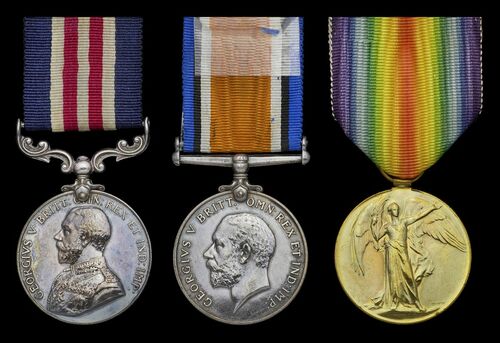
Auction: 24002 - Orders, Decorations and Medals
Lot: 162
A Great War M.M. group of three to Private G. Hartle, Worcestershire Regiment
Military Medal, G.V.R. (203690 Pte G. Hartle. 1/7 Worc: R. - T.F.); British War and Victory Medals (20722 Pte. G. Hartle. Worc R.) light contact marks, very fine (3)
M.M. London Gazette 28 January 1918.
George Hartle appears to have been born in Bromsgrove, Worcestershire in 1885 and worked at Fussell and Drury Boot Factory, Bromsgrove. He enlisted into the Worcestershire Regiment in the Spring of 1916 and went to France in the August of the same year, posted to the 1/7th Battalion. Hartle saw active service on the Somme, in the area south of Thiepval and Beaumont Hamel immediately witnessing harsh fighting over the following months. The Battalion was involved in the fighting to capture Epehy in March-April, 1917 and a severe action on 24-25 April, to capture Gillemont Farm, not far from Hamel, which was a strategic spur that provided a view towards the Hindenberg Line in that area.
As a result of the courage and bravery shown by the Officers and men of the Battalion, during the attack and subsequent defence of Gillemont Farm, the following awards were also bestowed:
Bar to D.S.O.,
Bar to M.C.,
Four Military Crosses,
Seven Military Medals.
Casualties had been high - 2 Officers killed, 4 Officers wounded, 12 other ranks killed, 90 wounded and a further 29 were missing.
The next big engagement came in the form of the Battle of Langemarck and Ypres during August, 1917.
On 9th October, 1917, a large scale attack was conducted against the village of Poelcappelle. Three Worcestershire Regiments were involved in the operation - 4th, 1/7th and 1/8th Battalions. At 5.20 am, in heavy rain and under a creeping British barrage, the 4th Battalion attacked the line 1 mile north of the 1/7th and 1/8th Worcesters, over shell holed, waterlogged ground and across the many small streams that criss-crossed the area. At one point, two companies of the 4th Battalion were held up by one of the many enemy block houses, containing a machine gun crew, who were pouring a withering fire on the troops. Attack from the front was impossible. The block house had not been hit and disabled by the British artillery barrage. It was here that Private Dancox, under his own initiative, moving from shell hole to shell hole under intense fire, managed to make his way around to the rear of the block house. Taking out a grenade, he walked into the rear block house entrance. The German crew were so surprised and terrified that they immediately surrendered. Dancox walked around to the front of the block house with the enemy prisoners to loud applause and cheering from his comrades - he had single handedly disabled a machine gun and its crew responsible for a number of casualties and the holding up of the advance in that section of the line. Dancox, who had captured the machine gun and its ammunition, continued to use that gun to good effect for the remainder of that day - for his bravery, he was awarded the Victoria Cross.
The 1/7th and 1/8th Battalions moved off at the same time, but failed to make the same progress over the waterlogged ground and were soon left behind by the Artillery barrage, allowing the enemy, who had taken cover in the many shell craters, to get their guns into action again and pour heavy fire onto the advancing Worcesters. Whilst some progress was made and objectives taken, it was nowhere near the success enjoyed by the 4th Battalion. During the next day, the advances made were consolidated and many of the injured were evacuated and the dead, where possible, were buried. In total, once relieved by the 7th Seaforth Highlanders at around midnight on 10th October, 5 Officers and 54 other ranks had been killed, 5 Officers and 135 other ranks wounded and 22 missing.
Hartle had been a stretcher bearer during this intense action, as reported in the Bromsgrove Messenger:
'During the attack north west of...this stretcher bearer showed great courage and devotion to duty, moving about in the enemy barrage and under heavy fire, and over difficult ground, brought in many of the wounded.'
Hartle died in 1937 in Bromsgrove.
Subject to 20% VAT on Buyer’s Premium. For more information please view Terms and Conditions for Buyers.
Sold for
£380
Starting price
£350




